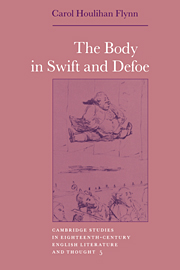Book contents
- Frontmatter
- Contents
- Acknowledgments
- List of abbreviations
- Introduction “The Dearness of things”: the body as matter for text
- 1 Dull organs: the matter of the body in the plague year
- 2 The burthen in the belly
- 3 Consuming desires: Defoe's sexual systems
- 4 Flesh and blood: Swift's sexual strategies
- 5 The ladies: d—ned, insolent, proud, unmannerly sluts
- 6 Chains of consumption: the bodies of the poor
- 7 Consumptive fictions: cannibalism in Defoe and Swift
- 8 Vital parts: Swift's necessary metaphors
- Afterword Suppose me dead; and then suppose
- Index
2 - The burthen in the belly
Published online by Cambridge University Press: 21 September 2009
- Frontmatter
- Contents
- Acknowledgments
- List of abbreviations
- Introduction “The Dearness of things”: the body as matter for text
- 1 Dull organs: the matter of the body in the plague year
- 2 The burthen in the belly
- 3 Consuming desires: Defoe's sexual systems
- 4 Flesh and blood: Swift's sexual strategies
- 5 The ladies: d—ned, insolent, proud, unmannerly sluts
- 6 Chains of consumption: the bodies of the poor
- 7 Consumptive fictions: cannibalism in Defoe and Swift
- 8 Vital parts: Swift's necessary metaphors
- Afterword Suppose me dead; and then suppose
- Index
Summary
Loose Thoughts, at first, like subterranean Fires,
Burn inward, smothering, with unchast Desires;
But getting Vent, to Rage and Fury turn,
Burst in Volcano's, and like Aetna burn;
The Heat increases as the Flames aspire,
And turns the solid Hills to liquid Fire.
So sensual Flames, when raging in the Soul,
First vitiate all the Parts, then fire the Whole;
Burn up the Bright, the Beauteous, the Sublime,
And turn our lawful Pleasures into Crime.
Defoe, Conjugal LewdnessI seek you beside me, but it seems you flee from me; and finally the fire devouring me dissipates these illusions and brings me to myself. By then I am so excited … You may not believe it, Usbek, but it is impossible to live like this, with fire coursing through my veins.
Montesquieu, The Persian LettersTwo such oddly representational pieces, written only six years apart, reveal a shared uneasiness about the physical body as material not just in the way, but as material that when “fired,” becomes impossible to manage. Their authors confess the difficulties of reconciling desire and necessity, the impossibility of attaining what they both call “justice” in a system of physical economy that depends upon an injustice that can only be addressed indirectly. While both Defoe and Montesquieu write for an audience that supports views both patriarchal and capitalistic, their individual interpretations of the system they buttress expose its contradictions.
- Type
- Chapter
- Information
- The Body in Swift and Defoe , pp. 37 - 60Publisher: Cambridge University PressPrint publication year: 1990



